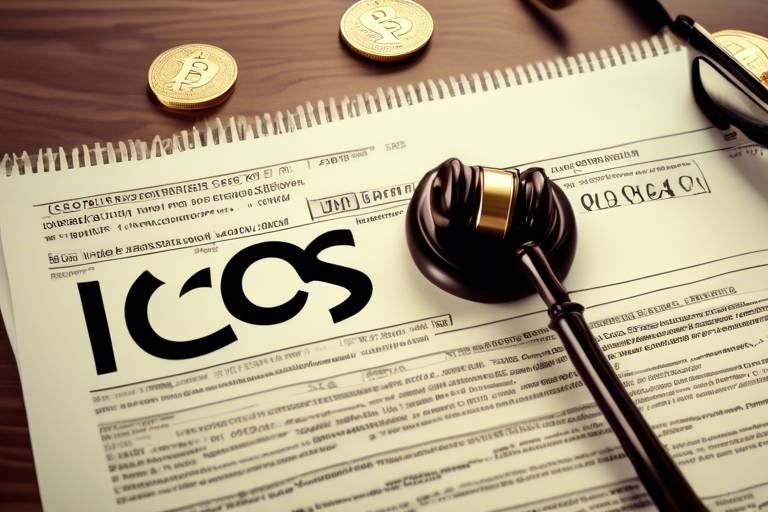Understanding Anti-Fraud Regulations in Cryptocurrency
Cryptocurrency has revolutionized the way we think about money, investments, and financial transactions. However, with great innovation comes great responsibility. As the digital asset space continues to grow, the need for anti-fraud regulations becomes increasingly critical. These regulations are designed not only to protect investors but also to enhance the overall integrity of the market. Imagine walking into a bustling marketplace where every stall is selling something different, but some vendors are trying to pull a fast one on unsuspecting customers. Anti-fraud regulations act as the vigilant security guards in this marketplace, ensuring that everyone plays fair and that the risk of scams is minimized.
In recent years, the cryptocurrency market has seen its fair share of fraudulent activities, from Ponzi schemes to fake ICOs (Initial Coin Offerings). These scams can lead to devastating financial losses for investors, shaking the very foundation of trust that the cryptocurrency ecosystem relies on. This is where the role of regulatory bodies comes into play. By implementing and enforcing regulations, these entities work tirelessly to create a safer environment for investors and to promote transparency within the market.
But what do these regulations actually entail? They encompass a variety of measures aimed at preventing fraud, including strict reporting requirements for cryptocurrency exchanges, guidelines for token offerings, and ongoing monitoring of trading practices. Regulatory bodies like the U.S. Securities and Exchange Commission (SEC) and the Commodity Futures Trading Commission (CFTC) are at the forefront of these efforts, ensuring that bad actors are held accountable and that legitimate businesses can thrive.
As we delve deeper into the intricacies of anti-fraud regulations, we will uncover the roles of key regulatory bodies, explore global perspectives on these regulations, and examine future trends that will shape the landscape of cryptocurrency compliance. The aim is to provide a comprehensive understanding of how these regulations function and why they are essential for the stability and growth of the cryptocurrency market.
Anti-fraud regulations play a crucial role in fostering trust in the cryptocurrency market, ensuring that investors are protected from scams and fraudulent activities that can undermine the entire ecosystem. Without these regulations, the market would be akin to a Wild West, where anything goes, and the risk of losing everything is alarmingly high. Investors need to feel secure in their transactions, and regulations help to provide that sense of security.
Various regulatory bodies oversee anti-fraud measures in cryptocurrency, including the SEC and CFTC in the U.S. Understanding their roles helps clarify how regulations are enforced and developed across different jurisdictions. These organizations are not just bureaucratic entities; they are the watchdogs that ensure fairness and transparency, acting as a buffer between the public and potential fraudsters.
The U.S. Securities and Exchange Commission (SEC) is pivotal in enforcing securities laws related to cryptocurrency, focusing on preventing fraud and protecting investors from deceptive practices in the digital asset space. The SEC has taken a proactive approach to regulate the market, providing guidelines that help companies navigate the complex landscape of cryptocurrency offerings.
The SEC has taken significant enforcement actions against fraudulent cryptocurrency schemes, highlighting its commitment to safeguarding investors and maintaining market integrity through legal repercussions for violators. These actions serve as a warning to potential fraudsters that the SEC is watching and will not hesitate to act.
The SEC has issued guidelines for cryptocurrency offerings, providing clarity on compliance requirements for issuers and helping to mitigate the risks associated with fraudulent activities in the market. By outlining what constitutes a security and the obligations of issuers, the SEC aims to create a more transparent and trustworthy environment for all participants.
The Commodity Futures Trading Commission (CFTC) regulates derivatives in the cryptocurrency market, focusing on preventing fraud and manipulation in trading practices while ensuring fair and transparent market conditions. The CFTC's oversight is crucial, especially as more investors turn to derivatives as a way to hedge their bets in this volatile market.
Different countries have varying approaches to anti-fraud regulations in cryptocurrency, reflecting their unique legal frameworks and economic conditions, which can significantly impact the global cryptocurrency landscape. As the world becomes more interconnected, the need for a cohesive regulatory approach is becoming increasingly apparent.
The European Union is developing comprehensive regulations for cryptocurrencies, addressing anti-fraud measures and ensuring a unified approach to protect investors and maintain market integrity across member states. This initiative aims to create a level playing field, allowing for innovation while safeguarding investors.
Countries in Asia, such as Japan and China, have implemented distinct anti-fraud regulations for cryptocurrencies, balancing innovation with investor protection while adapting to the rapidly evolving digital asset environment. These regulations reflect the unique challenges and opportunities that each country faces, demonstrating that there is no one-size-fits-all solution in the world of cryptocurrency.
As the cryptocurrency market continues to evolve, so will the anti-fraud regulations. Emerging technologies and market developments will shape future regulatory frameworks, aiming to enhance investor protection and market integrity. For instance, advancements in blockchain technology could lead to more transparent reporting practices, making it easier to trace transactions and identify fraudulent activities.
- What are anti-fraud regulations? - These are laws and guidelines designed to prevent fraudulent activities in the cryptocurrency market.
- Who enforces these regulations? - Regulatory bodies like the SEC and CFTC in the U.S. are primarily responsible for enforcing anti-fraud regulations.
- How do these regulations protect investors? - They create a safer environment by holding bad actors accountable and ensuring transparency in the market.
- Are anti-fraud regulations the same worldwide? - No, different countries have unique regulations based on their legal frameworks and economic conditions.

The Importance of Anti-Fraud Regulations
In an era where digital currencies are reshaping the financial landscape, anti-fraud regulations have become more crucial than ever. Imagine walking through a bustling market filled with vibrant stalls, each offering unique products. Now, consider that some vendors are selling counterfeit goods or engaging in deceptive practices. This scenario mirrors the cryptocurrency market, where the lack of regulation can lead to a breeding ground for scams and fraud. Anti-fraud regulations serve as a protective barrier, ensuring that investors can navigate this complex environment with confidence.
Without these regulations, the cryptocurrency market could easily become a wild west of financial transactions, rife with scams that could undermine investor trust. These regulations are designed to foster a safe trading environment, allowing legitimate projects to flourish while keeping fraudsters at bay. They not only protect investors but also enhance the overall integrity of the market, making it more appealing to institutional investors and newcomers alike.
Furthermore, anti-fraud regulations help to establish a clear framework for compliance, which is essential for the long-term sustainability of the cryptocurrency ecosystem. By setting standards and guidelines, regulators can mitigate risks associated with fraudulent activities, ensuring that all players adhere to a code of conduct that promotes transparency and accountability. This is akin to having a set of rules in a game; without them, chaos ensues, and the game loses its appeal.
To illustrate this further, consider the following key benefits of anti-fraud regulations:
- Investor Protection: Regulations safeguard investors from scams, ensuring their funds are secure.
- Market Integrity: By promoting transparency, regulations enhance the credibility of the cryptocurrency market.
- Encouragement of Innovation: A regulated environment encourages legitimate projects to innovate without fear of fraud.
In conclusion, the importance of anti-fraud regulations in the cryptocurrency market cannot be overstated. They are essential for building trust, protecting investors, and ensuring the market operates fairly. As the digital currency landscape continues to evolve, these regulations will play a pivotal role in shaping a secure and robust financial future.
Q1: What are anti-fraud regulations?
A1: Anti-fraud regulations are legal frameworks designed to prevent fraudulent activities in financial markets, including cryptocurrencies, ensuring investor protection and market integrity.
Q2: Why are these regulations important for cryptocurrency?
A2: They are important because they help to build trust among investors, protect against scams, and create a stable environment for legitimate projects to thrive.
Q3: Who enforces these regulations?
A3: In the U.S., the SEC and CFTC are the primary regulatory bodies enforcing anti-fraud measures in the cryptocurrency market.
Q4: How do anti-fraud regulations vary globally?
A4: Different countries have unique approaches to anti-fraud regulations, reflecting their legal frameworks and economic conditions, which can significantly impact the global cryptocurrency landscape.

Key Regulatory Bodies
When it comes to navigating the intricate world of cryptocurrency, understanding the is essential. These organizations play a pivotal role in shaping the legal landscape and ensuring that the market operates fairly and transparently. In the United States, the two most significant regulatory bodies are the Securities and Exchange Commission (SEC) and the Commodity Futures Trading Commission (CFTC). Each has its own jurisdiction and focus, but both aim to protect investors and maintain the integrity of the financial markets.
The SEC primarily oversees securities laws, which include many cryptocurrency offerings. By regulating these assets, the SEC seeks to prevent fraud and ensure that investors receive accurate information about the products they are investing in. This means that any cryptocurrency that qualifies as a security must adhere to strict disclosure requirements, similar to traditional stocks. The SEC's involvement has been a double-edged sword; while it fosters investor confidence, it can also stifle innovation due to stringent compliance demands.
On the other hand, the CFTC focuses on the regulation of derivatives in the cryptocurrency market. This includes futures and options contracts based on cryptocurrencies. The CFTC's mandate is to prevent market manipulation and fraud, ensuring that trading practices are fair and transparent. Unlike the SEC, the CFTC does not classify cryptocurrencies as securities, which allows it to take a different approach to regulation. This distinction has led to a unique regulatory environment where both bodies must collaborate to create a cohesive framework that protects investors while allowing for market growth.
Here’s a quick comparison of the roles of these two regulatory bodies:
| Regulatory Body | Focus Area | Primary Role |
|---|---|---|
| SEC | Securities | Enforces securities laws to protect investors and ensure transparency |
| CFTC | Derivatives | Regulates futures and options to prevent fraud and manipulation |
It's also worth noting that other countries have their own regulatory bodies, each with different approaches to cryptocurrency oversight. For instance, in the European Union, the European Securities and Markets Authority (ESMA) plays a significant role in establishing regulations that ensure a unified approach across member states. Meanwhile, in Asia, countries like Japan have implemented their own regulatory frameworks to balance innovation with investor protection.
As the cryptocurrency market continues to expand and evolve, the roles of these regulatory bodies will likely shift. They will need to adapt to new technologies and market developments, which could lead to changes in how they enforce anti-fraud regulations. This adaptability is crucial for fostering a safe environment for investors while encouraging innovation in the digital asset space.
- What is the role of the SEC in cryptocurrency regulation? The SEC enforces securities laws related to cryptocurrencies, focusing on preventing fraud and protecting investors.
- How does the CFTC differ from the SEC? The CFTC regulates derivatives in the cryptocurrency market, while the SEC oversees securities laws.
- Are there regulatory bodies outside the U.S.? Yes, many countries have their own regulatory bodies, such as ESMA in the EU and various agencies in Asia.

SEC's Role in Cryptocurrency Regulation
The U.S. Securities and Exchange Commission (SEC) plays a vital role in the regulation of cryptocurrencies, acting as a guardian of investor interests in an increasingly complex digital landscape. With the rise of cryptocurrency as a financial asset, the SEC's involvement has become essential to ensure that the market remains fair and transparent. The SEC applies existing securities laws to the cryptocurrency space, which means that many digital assets are treated as securities. This classification is crucial because it subjects these assets to strict regulatory scrutiny, aiming to prevent fraudulent activities and protect investors.
One of the SEC's primary objectives is to maintain market integrity. By enforcing compliance with securities laws, the SEC aims to create an environment where investors can feel safe and confident in their transactions. This is particularly important in the cryptocurrency market, which has been plagued by scandals and scams. The SEC's regulatory framework helps to establish a level playing field for all participants, ensuring that no one can gain an unfair advantage through deceptive practices.
Furthermore, the SEC actively engages with the cryptocurrency community to provide guidance and clarity on compliance requirements. This interaction is crucial, as it helps issuers understand their obligations and the legal landscape they must navigate. For instance, the SEC has released several guidelines that outline what constitutes a security in the context of cryptocurrency, helping to demystify the regulatory process for both new and established projects. These guidelines are not just rules to follow; they serve as a roadmap for companies looking to innovate within the space while adhering to legal standards.
To illustrate the SEC's influence, consider the following table that summarizes key aspects of its role in cryptocurrency regulation:
| Aspect | Description |
|---|---|
| Investor Protection | Ensures that investors are safeguarded against fraud and misleading practices. |
| Market Integrity | Maintains a fair trading environment by enforcing compliance with securities laws. |
| Guidance | Provides clarity on regulatory requirements for cryptocurrency issuers. |
| Enforcement | Takes legal action against fraudulent schemes and non-compliant entities. |
In conclusion, the SEC's role in cryptocurrency regulation cannot be overstated. By enforcing compliance, offering guidance, and engaging with the community, the SEC not only protects investors but also fosters a healthier market environment. As the cryptocurrency landscape continues to evolve, the SEC's proactive approach will be crucial in addressing new challenges and ensuring that innovation does not come at the expense of investor safety.
- What is the SEC's primary role in cryptocurrency?
The SEC's primary role is to enforce securities laws to protect investors and maintain market integrity in the cryptocurrency space. - How does the SEC classify cryptocurrencies?
Many cryptocurrencies are classified as securities, which subjects them to the same regulations as traditional securities. - What kind of actions can the SEC take against fraudulent schemes?
The SEC can take legal action, including fines and penalties, against individuals or companies involved in fraudulent activities. - Are there guidelines for cryptocurrency issuers?
Yes, the SEC has issued guidelines that clarify compliance requirements for cryptocurrency offerings.

Enforcement Actions by the SEC
The U.S. Securities and Exchange Commission (SEC) has been at the forefront of combating fraud in the cryptocurrency space, taking decisive enforcement actions against various fraudulent schemes. These actions are not just about punishing wrongdoers; they serve as a crucial warning to potential violators, underscoring the SEC's commitment to maintaining a fair and transparent market. For instance, the SEC has targeted initial coin offerings (ICOs) that were marketed as securities but failed to comply with existing regulations. By doing so, they protect unsuspecting investors from falling prey to scams that could result in significant financial losses.
One of the most notable enforcement actions took place in 2018 when the SEC charged a company called Plexcoin with conducting an unregistered ICO. The SEC alleged that Plexcoin misled investors about the potential returns, promising profits of 1,354% in less than a month. This case highlighted the SEC's vigilance in scrutinizing ICOs and ensuring that companies adhere to transparency and honesty in their communications with investors. The SEC's actions resulted in a temporary restraining order against Plexcoin, effectively halting its operations and protecting investors from further losses.
In addition to specific cases like Plexcoin, the SEC has also issued a range of penalties and fines against various entities involved in fraudulent activities. For example, in 2020, the SEC imposed a $4 million penalty on a cryptocurrency company for misleading investors about its business operations and financial health. These enforcement actions not only serve as a punitive measure but also as a deterrent, signaling to the market that fraudulent behavior will not be tolerated.
Furthermore, the SEC has established a dedicated Cyber Unit to focus specifically on cyber-related misconduct, including fraud in the cryptocurrency sector. This unit is equipped to investigate and take action against a wide array of fraudulent schemes, from Ponzi schemes to market manipulation. The proactive stance of the SEC demonstrates their recognition of the unique challenges posed by the digital asset landscape and their commitment to adapting their enforcement strategies accordingly.
To summarize, the SEC's enforcement actions are vital in shaping the cryptocurrency market. They not only protect investors but also foster a culture of compliance and ethical behavior among cryptocurrency issuers. As the market continues to grow and evolve, the SEC's role will undoubtedly remain crucial in ensuring that the principles of transparency and accountability are upheld.
- What is the SEC's primary role in cryptocurrency regulation?
The SEC's primary role is to enforce securities laws and protect investors from fraud in the cryptocurrency market. - How does the SEC investigate fraudulent cryptocurrency schemes?
The SEC employs a dedicated Cyber Unit to investigate misconduct, utilizing various tools and techniques to uncover fraudulent activities. - What are some examples of SEC enforcement actions?
Notable actions include charges against Plexcoin for misleading investors and penalties against companies for unregistered ICOs. - Why are enforcement actions important for the cryptocurrency market?
They help maintain market integrity, deter fraudulent behavior, and protect investors from potential losses.

Guidelines Issued by the SEC
The U.S. Securities and Exchange Commission (SEC) has taken significant strides in providing clarity regarding the compliance requirements for cryptocurrency offerings. These guidelines are essential for ensuring that both new and existing cryptocurrency projects adhere to legal standards, thereby fostering a safer investment environment. By outlining the rules and expectations, the SEC aims to mitigate the risks associated with fraudulent activities that have plagued the market in the past.
One of the primary aspects of these guidelines is the classification of cryptocurrencies. The SEC often evaluates whether a digital asset qualifies as a security, which can significantly impact how it is regulated. If a cryptocurrency is deemed a security, it must comply with the same regulations that govern traditional securities. This classification is pivotal because it dictates the level of transparency and investor protection required. To help issuers navigate this complex landscape, the SEC has provided a framework that includes:
- Registration Requirements: Issuers must register their offerings with the SEC unless a valid exemption applies. This registration process is designed to ensure that investors receive adequate information about the investment opportunity.
- Disclosure Obligations: Companies must disclose material information about their business, financial condition, and risks associated with the investment. This transparency helps investors make informed decisions.
- Ongoing Reporting: After an initial offering, issuers are often required to file periodic reports to keep investors updated on their financial performance and any significant developments.
Moreover, the SEC emphasizes the importance of anti-fraud provisions. These provisions are crucial in protecting investors from misleading statements or deceptive practices. The SEC has made it clear that any attempt to defraud investors through false information or manipulation will result in serious legal repercussions. This commitment to enforcement helps maintain a level playing field in the cryptocurrency market.
In addition to these requirements, the SEC has also issued guidance on Initial Coin Offerings (ICOs) and other fundraising mechanisms. They encourage issuers to consult with legal experts to ensure compliance, thus preventing unintentional violations that could lead to severe penalties. The SEC's proactive approach aims to strike a balance between fostering innovation in the cryptocurrency space and protecting investors from potential fraud.
As the cryptocurrency landscape continues to evolve, the SEC remains vigilant, regularly updating its guidelines to address emerging trends and technologies. This adaptability is vital for maintaining investor trust and ensuring the integrity of the market. Ultimately, the SEC’s guidelines serve as a foundational framework that helps safeguard investors while promoting a healthy and transparent cryptocurrency ecosystem.
- What is the SEC's role in cryptocurrency regulation? The SEC enforces securities laws related to cryptocurrencies, focusing on preventing fraud and protecting investors.
- How does the SEC determine if a cryptocurrency is a security? The SEC evaluates various factors, including the expectation of profits and the efforts of others, to classify a digital asset.
- What are the consequences of non-compliance with SEC guidelines? Issuers that fail to comply may face legal actions, including fines and penalties, and could be barred from future offerings.

CFTC's Oversight of Derivative Markets
The Commodity Futures Trading Commission (CFTC) plays a vital role in regulating the derivatives market in the realm of cryptocurrency. As the digital asset landscape evolves, the CFTC's oversight ensures that trading practices remain fair and transparent, which is crucial for maintaining investor confidence. With the rapid growth of cryptocurrency derivatives, including futures and options, the CFTC has stepped up its efforts to monitor and regulate these financial instruments, which can often be susceptible to fraud and market manipulation.
One of the primary responsibilities of the CFTC is to prevent fraudulent activities that can distort the market. This involves rigorous surveillance of trading practices and the implementation of strict compliance measures for market participants. The CFTC aims to create a level playing field where investors can engage in trading without the fear of being misled or defrauded. By enforcing regulations, the CFTC not only protects investors but also enhances the overall integrity of the financial system.
To illustrate the CFTC's impact, consider the following key areas of focus:
- Market Surveillance: The CFTC employs advanced technology and analytics to monitor trading activities, identifying suspicious patterns that may indicate fraud or manipulation.
- Compliance Requirements: Market participants must adhere to strict reporting and compliance standards, ensuring transparency in their operations and preventing deceptive practices.
- Education and Outreach: The CFTC actively engages with the public and industry stakeholders to raise awareness about the risks associated with cryptocurrency derivatives and the importance of regulatory compliance.
Moreover, the CFTC collaborates with other regulatory bodies, both domestically and internationally, to create a cohesive regulatory environment for cryptocurrency derivatives. This collaboration is essential, as the global nature of cryptocurrency trading means that actions taken in one jurisdiction can have far-reaching implications for markets worldwide. By working together, regulators can share information and best practices, which enhances the effectiveness of anti-fraud measures across borders.
As we look to the future, the CFTC's role in overseeing cryptocurrency derivatives will likely expand. With the continuous introduction of innovative financial products, the CFTC must remain vigilant and adaptable, ensuring that its regulatory framework evolves in tandem with market developments. This proactive approach is critical in safeguarding investors and maintaining market integrity in an industry that is as dynamic as it is promising.
- What is the role of the CFTC in cryptocurrency regulation? The CFTC regulates derivatives markets, including cryptocurrency futures and options, to prevent fraud and ensure fair trading practices.
- How does the CFTC prevent market manipulation? The CFTC employs market surveillance techniques and requires compliance from market participants to identify and address suspicious trading activities.
- Why are anti-fraud regulations important for cryptocurrency? Anti-fraud regulations help protect investors from scams and fraudulent activities, fostering trust and stability in the cryptocurrency market.

Global Perspectives on Anti-Fraud Regulations
The landscape of cryptocurrency regulation is as diverse as the currencies themselves. Different countries have adopted varying approaches to anti-fraud regulations, which reflect their unique legal frameworks and economic conditions. This divergence can significantly impact the global cryptocurrency market, creating a patchwork of rules that investors must navigate. Understanding these global perspectives is essential for anyone looking to invest or operate in the cryptocurrency space.
In the European Union, for instance, regulatory bodies are working diligently to establish comprehensive frameworks that address anti-fraud measures. The EU aims to create a unified approach that not only protects investors but also fosters innovation within the digital asset ecosystem. This is crucial as the EU seeks to maintain market integrity while encouraging technological advancements in blockchain and cryptocurrency.
On the other hand, Asia presents a contrasting regulatory environment. Countries like Japan have embraced cryptocurrencies, implementing robust regulations that balance innovation with investor protection. Japan's Financial Services Agency (FSA) has established guidelines that require cryptocurrency exchanges to register and comply with strict anti-money laundering (AML) measures. This proactive stance helps to mitigate risks associated with fraud and enhances consumer confidence in digital assets.
Conversely, China has taken a more stringent approach, imposing significant restrictions on cryptocurrency trading and initial coin offerings (ICOs). The Chinese government’s crackdown on these activities aims to curb financial risks and prevent fraud. This has led to a shift in the cryptocurrency market, with many projects relocating to more favorable jurisdictions, highlighting the importance of regulatory environments in shaping market dynamics.
To illustrate the varying approaches, here’s a brief comparison of regulatory stances in key regions:
| Region | Regulatory Approach | Key Regulatory Body |
|---|---|---|
| European Union | Comprehensive regulations in development, focusing on investor protection and market integrity | European Securities and Markets Authority (ESMA) |
| Japan | Proactive regulation with strict compliance requirements for exchanges | Financial Services Agency (FSA) |
| China | Strict bans on trading and ICOs to prevent financial risks | People's Bank of China (PBOC) |
This table highlights the contrasting approaches taken by different regions, showcasing how local regulations can shape the cryptocurrency landscape. As the market continues to evolve, these regulations will likely adapt to address emerging challenges and opportunities.
In conclusion, the global perspectives on anti-fraud regulations in cryptocurrency underscore the importance of understanding local laws and compliance requirements. Investors and businesses must stay informed about regulatory changes in their respective regions to navigate the complexities of the cryptocurrency market effectively. As we move forward, it will be fascinating to see how these regulations evolve and how they will impact the future of cryptocurrency on a global scale.
- What are anti-fraud regulations in cryptocurrency?
Anti-fraud regulations are laws and guidelines designed to protect investors from scams and fraudulent activities in the cryptocurrency market. - Why are these regulations important?
They foster trust in the cryptocurrency ecosystem, ensuring that investors are safeguarded against deceptive practices that could undermine the market. - How do different countries regulate cryptocurrency?
Countries have unique regulatory approaches based on their legal frameworks and economic conditions, leading to a variety of compliance requirements. - What role do regulatory bodies play?
Regulatory bodies enforce laws, issue guidelines, and take enforcement actions against fraudulent schemes to protect investors and maintain market integrity.

European Union Regulations
The European Union (EU) is making significant strides in the realm of cryptocurrency regulations, particularly in the area of anti-fraud measures. As the digital asset market expands, the EU recognizes the need for a cohesive regulatory framework that not only protects investors but also fosters innovation. The Markets in Crypto-Assets Regulation (MiCA) is one of the most notable legislative proposals aimed at achieving this balance. By establishing a comprehensive set of rules, MiCA seeks to create a unified approach across all EU member states, ensuring that the same standards apply regardless of where a cryptocurrency is issued or traded.
One of the primary goals of these regulations is to enhance transparency within the cryptocurrency market. This includes obligations for crypto-asset service providers to disclose relevant information to investors, such as the risks associated with their investments. The EU aims to prevent fraud by mandating that these entities adhere to strict guidelines regarding their operations, which will help in building trust among investors.
Moreover, the EU is keen on implementing anti-money laundering (AML) and counter-terrorism financing (CTF) measures tailored specifically for the cryptocurrency landscape. This approach is crucial, as it addresses the potential misuse of digital assets for illicit activities. By requiring cryptocurrency exchanges and wallet providers to perform thorough customer due diligence, the EU is taking proactive steps to mitigate risks associated with fraud and financial crimes.
To further illustrate the impact of these regulations, consider the following table that outlines some key aspects of the proposed MiCA framework:
| Aspect | Description |
|---|---|
| Licensing Requirements | Crypto-asset service providers must obtain licenses to operate within the EU, ensuring compliance with local laws. |
| Consumer Protection | Mandatory disclosures about risks and the nature of crypto-assets to protect investors from fraud. |
| Market Integrity | Measures to prevent market manipulation and ensure fair trading practices. |
| AML/CTF Compliance | Requirements for exchanges to implement robust AML and CTF measures to combat financial crimes. |
As the EU moves forward with these regulations, it is essential for both investors and cryptocurrency businesses to stay informed about the evolving landscape. The potential for a standardized regulatory framework across member states presents a unique opportunity for the cryptocurrency market to mature. By enhancing investor protection and market integrity, the EU aims to create a safer environment for all participants while still encouraging innovation in the digital asset space.
- What is MiCA? MiCA stands for Markets in Crypto-Assets Regulation, which is a proposed regulatory framework by the EU to govern cryptocurrency activities.
- How will MiCA affect investors? MiCA aims to enhance investor protection by ensuring transparency and requiring disclosures from crypto-asset service providers.
- Are there penalties for non-compliance? Yes, the regulations will impose penalties on entities that fail to comply with the established guidelines, ensuring accountability.
- Will these regulations stifle innovation? The EU believes that by providing clear guidelines, innovation can thrive within a safe and regulated environment.

Asia's Regulatory Landscape
Asia is a dynamic hub for cryptocurrency innovation, but with that innovation comes the pressing need for robust anti-fraud regulations. Countries across the continent are carving out their own unique regulatory frameworks to protect investors while fostering technological advancement. For instance, Japan stands out with its proactive approach, having established a licensing system for cryptocurrency exchanges under the Financial Services Agency (FSA). This regulatory framework not only aims to curb fraud but also enhances consumer confidence in digital assets.
On the other hand, China has taken a more stringent stance, implementing a comprehensive ban on cryptocurrency trading and initial coin offerings (ICOs). This approach reflects the government's desire to maintain financial stability and prevent capital outflow. Despite this, China is also investing heavily in blockchain technology, indicating a nuanced understanding of the potential benefits of digital currencies while prioritizing strict control over their use.
Moving south, Singapore is another player worth mentioning. The Monetary Authority of Singapore (MAS) has introduced the Payment Services Act, which regulates digital payment tokens and aims to prevent fraud while promoting innovation. This legislation provides a clear framework for cryptocurrency businesses, ensuring they adhere to anti-money laundering (AML) and counter-terrorism financing (CTF) measures. The Singaporean model is often viewed as a balanced approach, marrying regulation with innovation.
In contrast, countries like India are still grappling with how to regulate cryptocurrencies. The Reserve Bank of India (RBI) initially imposed a banking ban on crypto transactions, which was later overturned by the Supreme Court. However, the lack of a clear regulatory framework continues to create uncertainty for investors and businesses alike. As discussions around a potential cryptocurrency bill continue, the landscape remains in flux, highlighting the challenges of creating regulations that both protect investors and encourage technological growth.
Overall, the regulatory landscape in Asia is as diverse as the countries themselves. Each nation is navigating the delicate balance between fostering innovation and protecting investors from fraud. As these regulations evolve, they will play a crucial role in shaping the future of cryptocurrency in the region. The following table summarizes the key regulatory approaches taken by various Asian countries:
| Country | Regulatory Body | Key Regulations |
|---|---|---|
| Japan | Financial Services Agency (FSA) | Licensing system for exchanges |
| China | People's Bank of China (PBoC) | Ban on trading and ICOs |
| Singapore | Monetary Authority of Singapore (MAS) | Payment Services Act |
| India | Reserve Bank of India (RBI) | Ongoing discussions for a cryptocurrency bill |
As we look to the future, it’s clear that Asia's regulatory landscape will continue to evolve. The interplay between regulation and innovation will be crucial in determining how effectively countries can combat fraud while still promoting the growth of the cryptocurrency market. Investors and businesses alike must stay informed and adaptable, as changes in regulation can significantly impact the operational landscape.
- What is the role of the Financial Services Agency in Japan? The FSA regulates cryptocurrency exchanges and ensures they comply with anti-fraud measures.
- Why did China ban cryptocurrency trading? The ban was implemented to maintain financial stability and prevent capital outflow.
- How does Singapore promote cryptocurrency innovation? Through the Payment Services Act, which regulates digital payment tokens and encourages compliance.
- What is the current status of cryptocurrency regulation in India? India is in discussions to create a comprehensive cryptocurrency bill, following the Supreme Court's overturning of the RBI's banking ban.

Future Trends in Anti-Fraud Regulations
The cryptocurrency landscape is like a fast-moving river, constantly changing and evolving. As we look towards the future, it's clear that anti-fraud regulations will need to adapt just as quickly to keep pace with emerging technologies and market dynamics. One of the most significant trends is the integration of artificial intelligence (AI) and machine learning into regulatory frameworks. These technologies can help in identifying fraudulent activities by analyzing vast amounts of transaction data in real time, making it easier to spot irregularities that could indicate fraud.
Moreover, as cryptocurrencies gain more mainstream acceptance, regulatory bodies are likely to adopt a more proactive approach rather than a reactive one. This means that regulations may be established before issues arise, creating a more stable environment for investors. For instance, regulators might implement mandatory reporting requirements for cryptocurrency exchanges to improve transparency and accountability. This could lead to a more trustworthy ecosystem where investors feel secure in their transactions.
Another exciting trend is the development of global regulatory standards. As cryptocurrencies are inherently borderless, the need for a unified approach to regulation is becoming increasingly evident. Regulatory bodies from different countries may collaborate to create standards that ensure a consistent level of investor protection worldwide. This could significantly reduce the chances of fraud, as it would be harder for bad actors to exploit regulatory loopholes across jurisdictions.
Furthermore, we might see a rise in the use of blockchain technology itself for regulatory compliance. By utilizing smart contracts, transactions can be automatically verified against regulatory requirements, making compliance easier for businesses and reducing the potential for fraud. Imagine a world where every transaction is recorded on an immutable ledger, providing a transparent and verifiable history of all activities. This could revolutionize how we approach anti-fraud measures in the cryptocurrency space.
Lastly, education and awareness will play a crucial role in the future of anti-fraud regulations. As the market grows, so does the need for investors to understand the risks associated with cryptocurrency investments. Regulatory bodies may implement educational initiatives to inform the public about potential scams and how to protect themselves. This proactive approach to consumer education can empower investors to make informed decisions and recognize fraudulent schemes before they become victims.
In conclusion, the future of anti-fraud regulations in cryptocurrency is not just about tightening rules; it's about embracing innovation and collaboration. By leveraging technology, fostering global cooperation, and prioritizing education, we can create a safer environment for all participants in the cryptocurrency market. The journey ahead may be challenging, but with the right strategies in place, we can navigate the complexities of this ever-evolving landscape.
- What are anti-fraud regulations in cryptocurrency?
Anti-fraud regulations in cryptocurrency are rules and guidelines designed to protect investors from scams and fraudulent activities in the digital asset space.
- How do regulatory bodies enforce these regulations?
Regulatory bodies, such as the SEC and CFTC, enforce these regulations through investigations, legal actions, and by providing guidelines for compliance.
- Will future regulations be stricter?
Future regulations may become stricter as the market evolves, but they will also likely incorporate innovative technologies to enhance compliance and fraud detection.
- How can investors protect themselves from fraud?
Investors can protect themselves by staying informed about potential scams, using reputable exchanges, and being cautious of offers that seem too good to be true.
Frequently Asked Questions
- What are anti-fraud regulations in cryptocurrency?
Anti-fraud regulations in cryptocurrency are rules designed to protect investors from scams and fraudulent activities. They aim to foster trust in the digital asset market by ensuring transparency and accountability among cryptocurrency issuers and traders.
- Who regulates cryptocurrency in the United States?
In the United States, the primary regulatory bodies overseeing cryptocurrency are the Securities and Exchange Commission (SEC) and the Commodity Futures Trading Commission (CFTC). The SEC focuses on securities laws, while the CFTC regulates derivatives and trading practices.
- How does the SEC enforce anti-fraud regulations?
The SEC enforces anti-fraud regulations by investigating suspicious activities, taking legal actions against violators, and providing guidelines for compliance. Their enforcement actions help to deter fraudulent schemes and protect investors in the cryptocurrency space.
- What are the implications of non-compliance with these regulations?
Non-compliance with anti-fraud regulations can lead to severe consequences, including hefty fines, legal action, and a loss of reputation. Companies that fail to adhere to these rules risk being barred from operating in the cryptocurrency market.
- How do global regulations on cryptocurrency differ?
Global regulations on cryptocurrency vary significantly, with some countries adopting strict measures while others take a more lenient approach. For instance, the European Union is working towards unified regulations, while countries like China have imposed strict bans on cryptocurrency activities.
- What future trends can we expect in anti-fraud regulations?
As the cryptocurrency market evolves, we can expect regulations to adapt to emerging technologies and market developments. This may include enhanced compliance requirements, increased collaboration between regulatory bodies, and a focus on consumer protection to maintain market integrity.



















